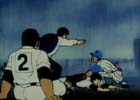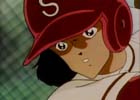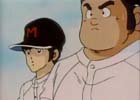Touch
| Genre: Comedy/Romance | ||
| Format: 101 Episodes | ||
| Allegiance: Group TAC | ||
| Director: Sugii Gisaburou | ||
| Vintage: 1985 – 1987 | ||
| Intelligence Agency Report by: Kuzu Ryu Sen | ||
| Uesugi Kazuya is an outstanding student, a well-rounded athlete, and the top male at Meisei Junior High according to a poll of the female student body. Uesugi Tatsuya is a subpar student, a lazy slob, and only received one vote in that same contest. Yet, no matter what anyone says, Kazuya and Tatsuya are actually twins. The two live next door to the Asakura family and their daughter, Minami. Naturally, being the same age as well as neighbours since birth, Tatsuya, Kazuya, and Minami are the best of friends. However, Minami has also changed, and is a top student as well as “Miss Meisei.” Of course, her newfound womanhood has not gone unnoticed by Kazuya or Tatsuya. | ||
|
|
||
| Field Agent Report by: Kuzu Ryu Sen | ||
| Plot Characters Impact Visual Audio |
9.00 9.75 9.75 8.50 9.00 |
|
| Overall | 9.50 | |
To set the record straight, I loathe baseball. Whenever it comes on, I always change the channel to something far more entertaining, such as curling. So naturally, Touch was hardly something that struck my interest immediately. Yet, something drew me to investigate the first few chapters of the manga, and the rest is history. Touch really is something stellar in terms of story telling, character development, and audio/visuals (despite having launched in 1987). Last but not least, it actually made baseball fun.
At first glance, Touch is your stereotypical love triangle with two polar opposite individuals competing for the same love interest. However, starting from the end of the first season, Touch is far from predictable, throwing more curves and knuckleballs than Tim Wakefield. Pacing is executed very well, accurately depicting how life tends to lead up to certain key events; in this case, the Koushien Preliminary Qualification Tournament. The cast is diverse, deep, and very realistic, with Uesugi Tatsuya being easily one of the finest characters ever from any anime. There isn’t really a single character that completely fits into a set stereotype, and it is very hard to predict relationship outcomes based only on the first half-dozen episodes, something that can’t be said for the latest generation of romantic comedies. The only problem with Touch’splot and characterization is that it tends to drop certain characters, particularly those from the first season, completely. A little more screen time would have been nice for Kuroki Takeshi, Nishio Sachiko, or Terashima Tomoko.
Of course, Touch is showing a bit of its age, but the animation and art are excellent. Action scenes are both accurate and fluid, and bring the sporting events to life. There are a few touches of reused cels in terms of crowd/cheerleader shots, but those can be easily ignored. The voice acting is superb, and the music is surprisingly excellent. The songs are catchy and fit the mood perfectly, with notable tunes being “Hoshi no Silhouette (Silhouette of the Stars)” and “Eien no Runner (Eternal Runner).”
Finally, Touch excels by exhibiting the soul of baseball. Players get muddy, coaches rack their brains trying to squeeze in an extra run, and players give 110%. The game that is depicted is distinctly Japanese, emphasizing “small ball” and the fundamentals rather than the home run. Aside from an almost complete lack of relief pitching, the game action in Touch is incredibly similar to that which one would find at a real high school/Little League baseball game. By doing this, Touch managed to add an extra dimension of magic to the journey of Tatsuya, Kazuya, and Minami, rather than just relegating the sport to a sideshow.
Touch is a show that has largely been ignored in North America, mostly due to its age. However, it is the best anime of the romantic comedy triumvirate of the 1980’s, combining action, romance, comedy through superb storytelling and lovable characters. The highest rated anime to ever air on Japanese television should definitely not be missed.




